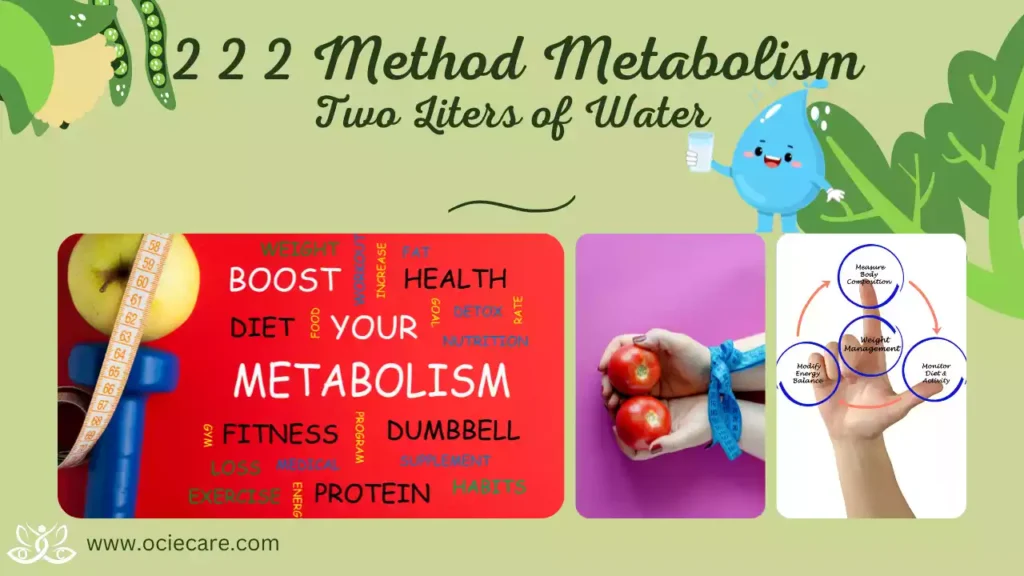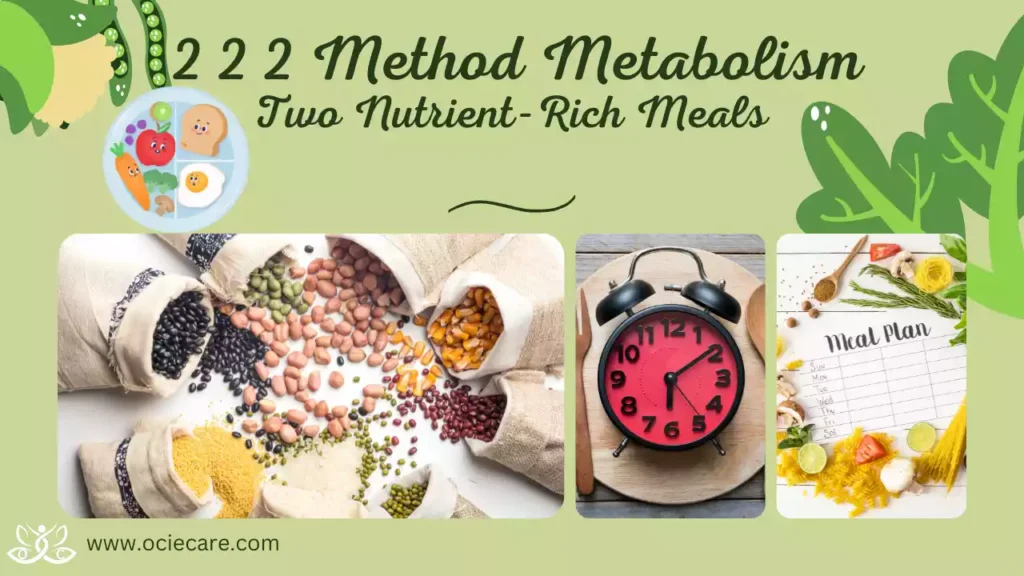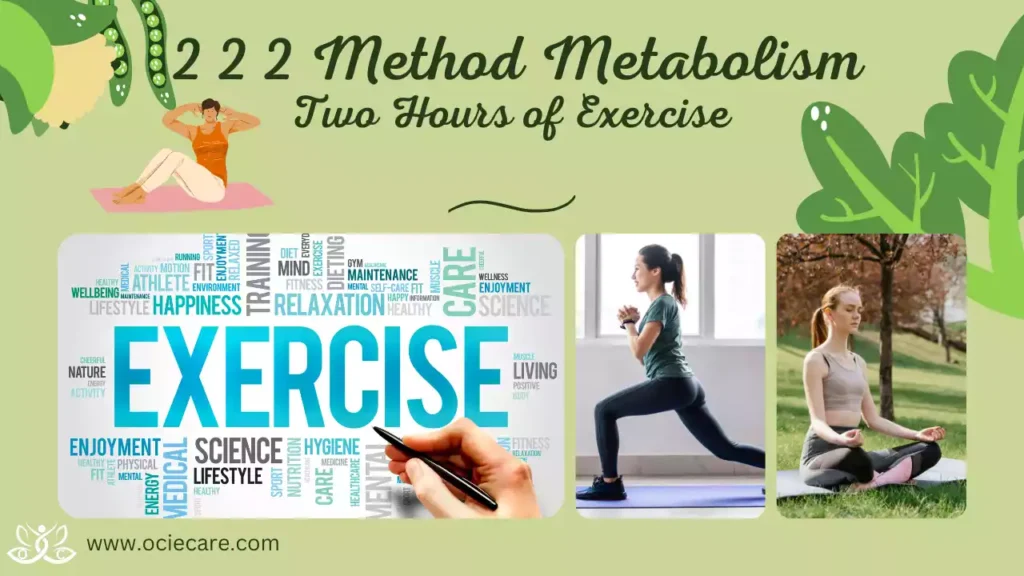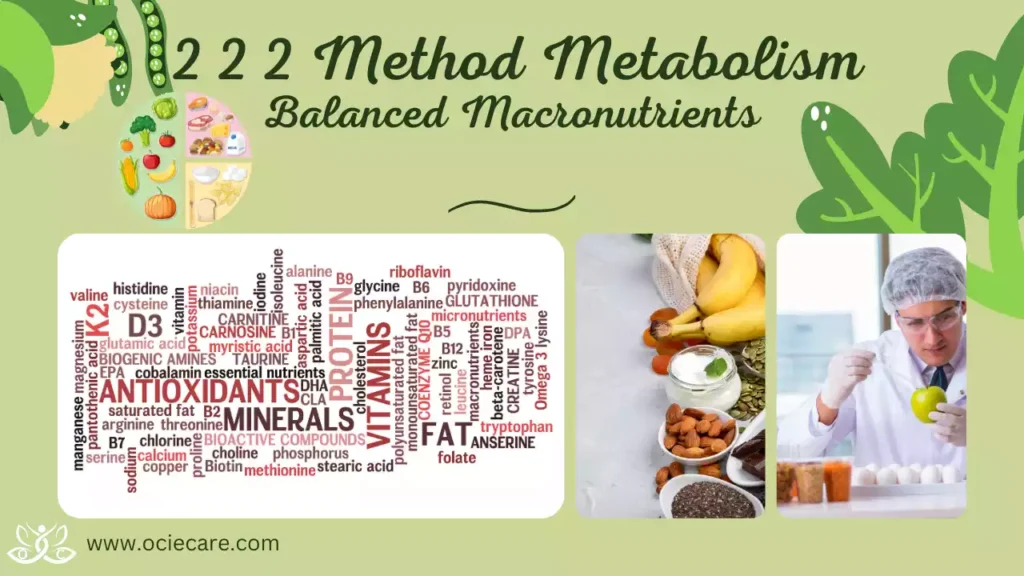Discover the 2 2 2 method metabolism: Boost Your Metabolism and Improve Your Health. Learn how two liters of water, two nutrient-rich meals, and two hours of exercise can transform your metabolism and energize your life.
In the quest for a healthier and more vibrant life, we often seek methods and strategies that can supercharge our metabolism. If you’re looking to revitalize your energy levels, support weight management, and enhance your overall well-being, then the 2 2 2 method metabolism might just be the key you’ve been searching for.
This powerful approach encompasses hydration, nutrition, exercise, and balanced macronutrients, all designed to optimize your metabolism and help you embark on a journey toward a more energetic and healthier you.
In this exploration of the 2 2 2 method metabolism, we’ll delve deep into its principles, benefits, and how it can revolutionize your metabolic health. Get ready to unleash the potential of your metabolism like never before.
Understanding Metabolism
Before we dive into the details of the 2 2 2 method metabolism, let’s first understand what metabolism is. In simple terms, metabolism refers to the chemical processes that occur within your body to maintain life. It includes two key components.
Let’s delve deeper into understanding metabolism and its two key components: Basal Metabolic Rate (BMR) and the Thermic Effect of Food (TEF).
A. Basal Metabolic Rate (BMR)
Your Basal Metabolic Rate (BMR) is a fundamental aspect of your metabolism. Think of it as the energy your body expends to maintain its basic functions while at rest. These basic functions include:
I. Breathing:
- Even when you’re completely at rest, your body needs energy to inhale and exhale air.
- Your respiratory muscles are constantly at work to ensure a steady flow of oxygen and removal of carbon dioxide.
II. Circulation:
- Your heart never takes a break. It continuously pumps blood throughout your body, supplying vital nutrients and oxygen to your cells while removing waste products.
- This constant circulation requires energy.
III. Cell Production and Maintenance:
- Cells are the building blocks of your body. They divide, replicate, and repair themselves as needed.
- These cellular processes demand a significant amount of energy to ensure your body remains healthy and functional.
Your BMR is highly individualized and influenced by several factors:
– Age:
- Generally, younger individuals have a higher BMR because their bodies are still growing and developing. As you age, your BMR tends to decrease.
– Gender:
- Males usually have a slightly higher BMR than females due to differences in muscle mass and hormonal variations.
– Genetics:
- Your genetic makeup plays a crucial role in determining your BMR.
- Some people are genetically predisposed to have a faster metabolism, while others have a slower one.
B. Thermic Effect of Food (TEF)
TEF represents the calories your body expends while digesting and absorbing the food you consume. This process involves breaking down complex nutrients into simpler forms that your body can use.
Here’s how TEF works:
I. Macronutrients:
- Different macronutrients have varying TEF values.
- Protein requires the most energy to be metabolized, with approximately 20-30% of its calories burned during digestion.
- Carbohydrates come next, with about 5-10% of their calories used during digestion.
- Fats have the lowest TEF, with only about 0-3% of their calories expended during metabolism.
II. Meal Composition:
- The composition of your meals also influences TEF.
- A balanced meal with a mix of protein, carbohydrates, and healthy fats can increase the overall TEF compared to a meal that’s high in just one macronutrient.
III. Meal Frequency:
- Interestingly, the frequency of your meals can affect TEF.
- Eating smaller, more frequent meals can slightly boost your metabolism compared to consuming the same number of calories in larger, less frequent meals.
Summary:
understanding metabolism involves recognizing that it’s a complex process encompassing BMR and TEF. Your BMR dictates the energy required for basic bodily functions, while TEF represents the energy expended during food digestion. Both factors play crucial roles in your overall metabolism and can be influenced by various factors such as age, gender, genetics, and meal composition.
The 2 2 2 Method Metabolism
Now, let’s explore the 2 2 2 Method Metabolism, a simple yet effective way to boost your metabolism and support your weight loss journey.
1. Two Liters of Water

Start your day by hydrating your body with two liters of water. Water plays a crucial role in various metabolic processes, including the breakdown of fats and carbohydrates. It also helps suppress appetite, reducing the chances of overeating.
let’s dive deeper into the importance of starting your day with two liters of water and how it affects your metabolism and overall health.
A. The Role of Water in Metabolism
Water is often underestimated in its role in metabolism, but it’s a critical component. When you wake up and hydrate your body with two liters of water, you’re jumpstarting several essential metabolic processes:
I. Digestion and Nutrient Absorption:
- Water aids in the breakdown of food in your stomach and intestines.
- It helps dissolve nutrients, making them more accessible for absorption into your bloodstream.
- Efficient digestion and nutrient absorption are vital for maintaining energy levels and overall health.
II. Thermogenesis:
- Drinking cold water can slightly increase your metabolic rate as your body expends energy to warm the water to body temperature.
- This increase in metabolic rate, albeit small, contributes to burning extra calories.
III. Detoxification:
- Water is essential for the proper functioning of your kidneys and liver, your body’s primary detoxification organs.
- These organs rely on an adequate intake of water to flush out waste products and toxins from your body.
IV. Transport of Nutrients and Oxygen:
- Water serves as a medium for transporting essential nutrients and oxygen to your cells.
- This ensures that your body’s cells receive the necessary fuel to perform their functions efficiently.
B. Appetite Suppression
Hydrating with two liters of water in the morning can also help with appetite control throughout the day:
I. Stomach Distension:
- Drinking a substantial amount of water in the morning can create a feeling of fullness or stomach distension.
- This sensation can help reduce hunger and the urge to overeat during the early hours of the day.
II. Caloric Intake Reduction:
- When you start your day well-hydrated, you might be less inclined to consume calorie-dense beverages or snacks.
- This can lead to reduced overall caloric intake, which is beneficial for weight management.
C. Weight Management and Metabolism
Proper hydration is closely linked to maintaining a healthy body weight, which in turn affects your metabolism:
I. Fat and Carbohydrate Metabolism:
- Water is essential for the metabolic processes that break down fats and carbohydrates into usable energy.
- Ensuring you’re well-hydrated can optimize these processes, potentially aiding in weight loss efforts.
II. Energy Levels:
- Dehydration can lead to fatigue and reduced physical activity, which can negatively impact your metabolism.
- Staying hydrated helps maintain your energy levels, enabling you to engage in physical activities that further support your metabolism.
Summary:
In conclusion, starting your day with two liters of water goes beyond simple hydration. It kickstarts critical metabolic processes, supports efficient digestion, aids in detoxification, and can help control your appetite. Proper hydration is a foundational element for overall health and can positively influence your metabolism and weight management goals.
2. Two Nutrient-Rich Meals

Instead of the traditional three large meals a day, opt for two nutrient-rich meals and a healthy snack in between. This approach keeps your metabolism active throughout the day. Focus on incorporating lean proteins, whole grains, fruits, and vegetables into your meals.
let’s delve deeper into the concept of having two nutrient-rich meals and a healthy snack, rather than the traditional three large meals a day, and how this approach can benefit your metabolism and overall health.
A. Metabolism and Meal Frequency
The idea of having two nutrient-rich meals and a snack is rooted in the concept of meal frequency and its impact on metabolism:
I. Continuous Energy Input:
- Traditional three-meal-a-day patterns can create long gaps between meals, potentially causing fluctuations in blood sugar levels.
- This can lead to feelings of energy slumps and hunger, affecting your metabolism negatively.
II. Steady Metabolism:
- The two-meal approach promotes more frequent energy input, keeping your metabolism active throughout the day.
- It can help maintain stable blood sugar levels and prevent extreme hunger or overeating during main meals.
B. Nutrient Density
The emphasis on nutrient-rich meals is crucial for optimizing your metabolism and overall health:
I. Lean Proteins:
- Proteins are essential for muscle maintenance and repair.
- They have a high thermic effect, meaning they require more energy for digestion and can slightly boost your metabolic rate.
II. Whole Grains:
- Whole grains provide complex carbohydrates that release energy slowly, providing a steady source of fuel throughout the day.
- They also offer essential vitamins, minerals, and fiber that support overall health.
III. Fruits and Vegetables:
- Fruits and vegetables are rich in vitamins, minerals, antioxidants, and fiber.
- They aid digestion, promote satiety, and provide essential nutrients for various metabolic processes.
C. Meal Timing
The timing of your two nutrient-rich meals and the healthy snack can be strategically planned for optimal metabolic benefits:
I. Breakfast:
- Start your day with a balanced breakfast that includes lean protein, whole grains, and fruits or vegetables.
- This provides a solid foundation for your metabolism and helps stabilize blood sugar levels.
II. Snack:
- The healthy snack between meals can help prevent excessive hunger and overeating during lunch or dinner.
- Opt for a snack that combines protein and fiber, such as Greek yogurt with berries or a handful of nuts.
III. Lunch and Dinner:
- Both main meals should include a variety of nutrient-rich foods, focusing on lean proteins, whole grains, and plenty of vegetables.
- Balancing macronutrients and incorporating a range of colorful fruits and vegetables ensures you’re getting a broad spectrum of nutrients.
D. Weight Management and Metabolism
The two-meal approach with nutrient-rich choices can positively impact weight management:
I. Caloric Control:
- By spreading your meals throughout the day, you may naturally control your caloric intake, making it easier to maintain or lose weight.
II. Metabolic Efficiency:
- Nutrient-dense meals provide the essential components your body needs for efficient metabolism.
- This can support weight loss and energy levels.
Summary:
In conclusion, adopting the two nutrient-rich meals and snack approach can help maintain a steady metabolism, stabilize blood sugar levels, and support weight management. Emphasizing lean proteins, whole grains, fruits, and vegetables ensures you’re providing your body with the essential nutrients it needs for optimal functioning and overall health.
3. Two Hours of Exercise

Regular physical activity is a cornerstone of a healthy metabolism. Aim for at least two hours of exercise per week. You don’t need to hit the gym for intense workouts; activities like brisk walking, swimming, or cycling can do wonders for your metabolism.
let’s explore in-depth why regular physical activity, including at least two hours of exercise per week, is vital for a healthy metabolism and overall well-being.
A. Exercise and Metabolism
I. Metabolism Boost
Physical activity is a key driver of a healthy metabolism. Here’s how it works:
a. Increased Energy Expenditure:
- Exercise requires energy. When you engage in physical activity, your body burns calories to fuel your muscles and support various physiological processes.
- This increased energy expenditure can lead to a higher basal metabolic rate (BMR) and a more efficient metabolism.
b. Muscle Mass Preservation and Growth:
- Exercise, particularly resistance training, helps preserve and build lean muscle mass.
- Muscle tissue burns more calories at rest compared to fat tissue, contributing to an elevated BMR.
c. Insulin Sensitivity:
- Regular physical activity improves insulin sensitivity, allowing your cells to better utilize glucose for energy.
- This can help prevent insulin resistance and support stable blood sugar levels.
II. Metabolism Beyond the Gym
Exercise benefits your metabolism in various ways, both during and after your workout:
a. Post-Exercise Caloric Burn:
- After a workout, your body continues to burn calories to repair muscle tissue and restore energy reserves.
- This post-exercise “afterburn” can extend the metabolic benefits of your workout.
b. Appetite Regulation:
- Exercise can help regulate appetite hormones, potentially reducing overeating and aiding in weight management.
B. Two Hours of Exercise per Week
I. Achievable and Effective
Aiming for at least two hours of exercise per week is a realistic and effective goal for many individuals. Here’s why:
a. Manageable Time Commitment:
- Two hours per week can be spread across multiple sessions, making it feasible for even the busiest schedules.
b. Variety of Activities:
- You don’t need to spend hours at the gym.
- Activities like brisk walking, swimming, cycling, dancing, or even gardening can provide substantial health and metabolic benefits.
c. Consistency Matters:
- Consistency in exercise is more important than the duration of individual workouts.
- Regular, shorter sessions can be just as effective as longer, less frequent ones.
II. Health Benefits
Engaging in two hours of exercise per week offers numerous health advantages:
a. Cardiovascular Health:
- Physical activity strengthens the heart, lowers blood pressure, and improves overall cardiovascular health.
b. Weight Management:
- Exercise supports weight loss or weight maintenance by burning calories and increasing metabolism.
c. Mood and Mental Health:
- Exercise releases endorphins, which can reduce stress, anxiety, and depression, promoting overall well-being.
d. Bone Health:
- Weight-bearing exercises, such as walking and dancing, can help maintain bone density, reducing the risk of osteoporosis.
III. Tailored to Your Goals
The specific type and intensity of exercise should align with your goals:
a. Aerobic Exercise:
- For general health and metabolism, aerobic activities like brisk walking, jogging, or swimming are effective.
b. Strength Training:
- Incorporating resistance training with weights or bodyweight exercises can further boost muscle mass and metabolism.
c. Flexibility and Balance:
- Activities like yoga or tai chi can enhance flexibility and balance, contributing to overall fitness.
Summary:
In conclusion, committing to at least two hours of exercise per week is a practical and impactful way to support a healthy metabolism. Regular physical activity not only boosts metabolism but also offers a wide range of health benefits, making it an essential component of a balanced and active lifestyle. Remember that the key is consistency, and choosing activities you enjoy can make it easier to maintain a long-term exercise routine.
4. Balanced Macronutrients

Ensure that your meals are well-balanced with the right mix of macronutrients. Protein, carbohydrates, and healthy fats are essential for a properly functioning metabolism. Consult with a nutrition specialist to determine your specific requirements.
let’s delve deeper into the importance of balanced macronutrients for a properly functioning metabolism and why consulting a nutrition specialist can be beneficial.
A. Balanced Macronutrients and Metabolism
I. The Role of Macronutrients
Macronutrients are the primary nutrients your body needs for energy, growth, and overall well-being. They include:
a. Protein:
- Proteins are the building blocks of your body. They are essential for muscle, tissue repair, and the production of enzymes and hormones.
- Protein-rich foods also have a high thermic effect, meaning they require more energy for digestion and can slightly boost your metabolic rate.
b. Carbohydrates:
- Carbohydrates are your body’s primary source of energy.
- They are broken down into glucose, which fuels your cells and provides the energy needed for daily activities and exercise.
- Fiber, a type of carbohydrate, aids digestion and helps maintain stable blood sugar levels.
c. Healthy Fats:
- Fats are crucial for various metabolic functions, including the absorption of fat-soluble vitamins (A, D, E, and K) and the production of hormones.
- Healthy fats, such as those found in avocados, nuts, and olive oil, can support heart health and provide sustained energy.
II. Metabolic Efficiency
Balancing these macronutrients in your meals is essential for metabolic efficiency:
a. Steady Energy Levels:
- A well-balanced meal with a mix of macronutrients ensures a steady release of energy throughout the day, preventing energy crashes and supporting overall metabolism.
b. Muscle Preservation:
- Adequate protein intake is crucial for preserving and building lean muscle mass.
- Muscle tissue burns more calories at rest than fat tissue, contributing to an efficient metabolism.
c. Hormone Regulation:
- Healthy fats are needed for the production of hormones, including those that regulate metabolism, appetite, and mood.
B. Consulting a Nutrition Specialist
While the importance of balanced macronutrients is clear, the specific requirements can vary significantly from person to person. Here’s why consulting a nutrition specialist is valuable:
I. Personalized Assessment:
- A nutrition specialist can conduct a comprehensive assessment of your individual needs based on factors like age, gender, activity level, and health goals.
II. Tailored Guidance:
- They can provide personalized meal plans and recommendations to ensure you meet your specific macronutrient goals.
III. Optimal Health and Weight Management:
- Nutrition specialists can help you achieve and maintain a healthy weight, optimize your metabolism, and support overall well-being through dietary choices.
IV. Addressing Specific Needs:
- If you have dietary restrictions, allergies, or specific health conditions, a nutrition specialist can create a meal plan that accommodates these requirements while still promoting a balanced intake of macronutrients.
V. Long-Term Success:
- Nutrition specialists can offer ongoing support and guidance, helping you make sustainable changes to your diet and lifestyle for long-term health and metabolic benefits.
Summary:
In conclusion, balanced macronutrients are crucial for a properly functioning metabolism, steady energy levels, and overall health. While the general principles of balanced nutrition are well-established, consulting a nutrition specialist can help you tailor your diet to your unique needs, ensuring you receive the right mix of protein, carbohydrates, and healthy fats to support your metabolism and achieve your health goals.
The Final Thoughts on 2 2 2 Method Metabolism: A Holistic Approach to Metabolism
The 2 2 2 method metabolism is a holistic and practical approach designed to boost metabolism, support weight management, and enhance overall health. By breaking down the method into its core components, we can see how it can be a valuable tool in your journey towards a healthier, more energetic you:
1. Two Liters of Water
- Starting your day with adequate hydration is the foundation of the 2 2 2 method metabolism. Water is not just about quenching your thirst; it’s a vital component of numerous metabolic processes. It aids digestion, nutrient absorption, and detoxification. Additionally, it can help control your appetite and reduce the risk of overeating. Ensuring you’re well-hydrated sets the stage for a well-functioning metabolism from the moment you wake up.
2. Two Nutrient-Rich Meals
- Instead of the traditional three large meals, this method encourages two nutrient-dense main meals with a healthy snack in between is a 2nd steps of 2 2 2 method metabolism. This approach keeps your metabolism active throughout the day, stabilizes blood sugar levels, and reduces energy slumps. Prioritizing lean proteins, whole grains, fruits, and vegetables in your meals provides your body with the essential nutrients it needs for optimal functioning.
3. Two Hours of Exercise
- Physical activity is a cornerstone of a healthy metabolism and an important part of 2 2 2 method metabolism. Two hours of exercise per week might seem achievable, but its benefits are significant. Regular physical activity can increase energy expenditure, build and preserve muscle mass, improve insulin sensitivity, and boost overall metabolic efficiency. It’s a vital component in achieving and maintaining a healthy weight and promoting general well-being.
4. Balanced Macronutrients
- Balancing your macronutrients – protein, carbohydrates, and healthy fats – in your meals is essential for metabolic efficiency and important expects of 2 2 2 method metabolism. Each macronutrient plays a unique role in supporting your metabolism. Protein aids muscle preservation and has a thermic effect, carbohydrates provide essential energy, and healthy fats contribute to hormone regulation. Consulting a nutrition specialist ensures you meet your individual macronutrient requirements, promoting optimal health and weight management.
Final Thoughts
The 2 2 2 method metabolism is not a one-size-fits-all solution; it’s a flexible framework that can be adapted to suit your individual needs and preferences. Its strength lies in its simplicity and its holistic approach to metabolism. By focusing on hydration, nutrient-rich meals, regular physical activity, and balanced nutrition, you can positively impact your metabolism, energy levels, and overall health.
Remember, the road to a healthier metabolism is a journey, not a destination. It requires consistency, patience, and a commitment to making sustainable lifestyle changes. Whether you’re looking to lose weight, improve your energy levels, or enhance your overall well-being, the 2 2 2 method metabolism provides a practical roadmap to help you achieve your goals and embark on a path to a more vibrant and healthier life.
FAQs
Q. What is the 2 2 2 method metabolism?
A. The 2 2 2 method metabolism is a holistic approach to boosting metabolism and promoting overall health. It involves starting your day with two liters of water, consuming two nutrient-rich meals, engaging in two hours of exercise per week, and ensuring balanced macronutrients in your diet.
Q. How does drinking two liters of water help with metabolism?
A. Hydrating with two liters of water in the morning kickstarts essential metabolic processes, aids digestion, supports nutrient absorption, and can help control appetite, reducing the chances of overeating.
Q. What are nutrient-rich meals, and why are they important in the 2 2 2 method metabolism?
A. Nutrient-rich meals are balanced with a mix of macronutrients (protein, carbohydrates, and healthy fats) and include foods like lean proteins, whole grains, fruits, and vegetables. They provide essential nutrients for metabolism, energy, and overall health.
Q. Why is exercise a crucial component of the 2 2 2 method metabolism?
A. Regular physical activity, including at least two hours of exercise per week, increases energy expenditure, preserves muscle mass, improves insulin sensitivity, and enhances metabolic efficiency. It is vital for maintaining a healthy metabolism and supporting weight management.
Q. How can I incorporate the 2 2 2 method metabolism into my daily routine?
A. Start by drinking two liters of water in the morning, consuming nutrient-rich meals with balanced macronutrients, and engaging in physical activity for at least two hours per week. You can customize the method to suit your lifestyle and preferences.
Q. Do I need to consult a nutrition specialist for the 2 2 2 method metabolism?
A. While consulting a nutrition specialist is beneficial for personalized guidance, you can start by following the general principles of the 2 2 2 method metabolism. A specialist can help tailor the approach to your specific needs and goals.
Q. Can the 2 2 2 method metabolism help with weight loss?
A. Yes, the 2 2 2 method metabolism can support weight management by promoting a balanced diet, regular physical activity, and healthy metabolism. However, individual results may vary, and weight loss depends on various factors, including calorie intake and expenditure.
Q. Is the 2 2 2 method metabolism suitable for everyone?
A. The 2 2 2 method metabolism provides a flexible framework that can be adapted to different lifestyles and needs. However, individuals with specific medical conditions or dietary restrictions should consult a healthcare professional before making significant dietary or exercise changes.
Q. Can I adjust the two-hour exercise requirement to fit my schedule?
A. Absolutely! The two-hour exercise recommendation can be spread across multiple sessions and tailored to your schedule and fitness level. Consistency in regular physical activity is more important than the duration of individual workouts.
Q. Is the 2 2 2 method metabolism a long-term solution for better metabolism and health?
A. Yes, the 2 2 2 method metabolism is designed as a sustainable approach to improving metabolism and overall well-being. It encourages healthy habits that can be maintained for the long term, supporting a healthier and more energetic lifestyle.
You may also like to Know:

Can you be more specific about the content of your article? After reading it, I still have some doubts. Hope you can help me.
Can you be more specific about the content of your article? After reading it, I still have some doubts. Hope you can help me.
Can you be more specific about the content of your article? After reading it, I still have some doubts. Hope you can help me.